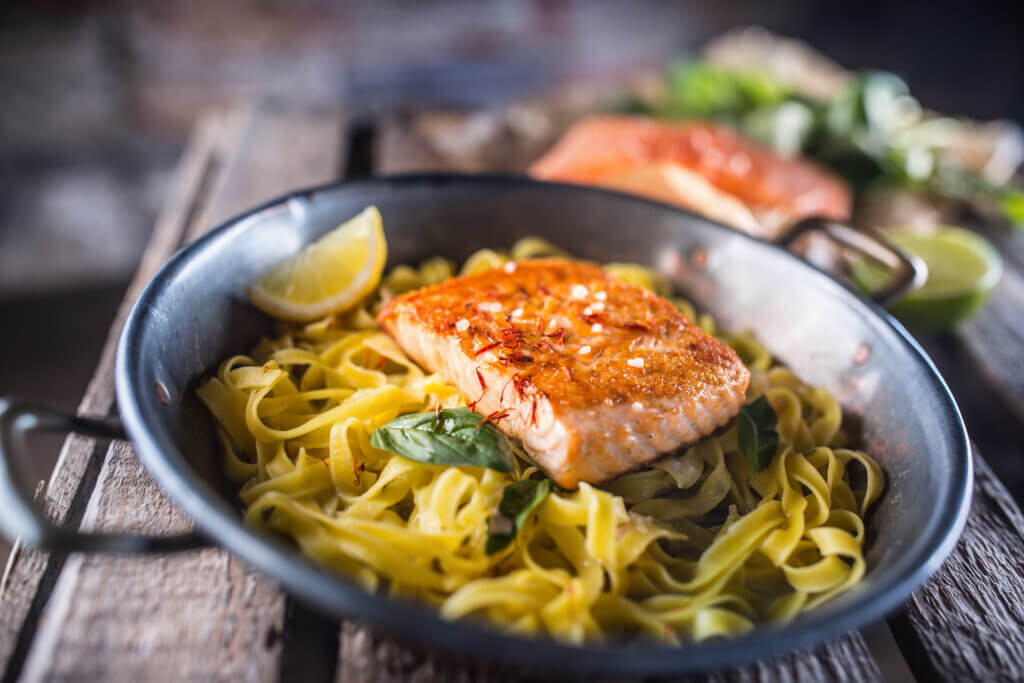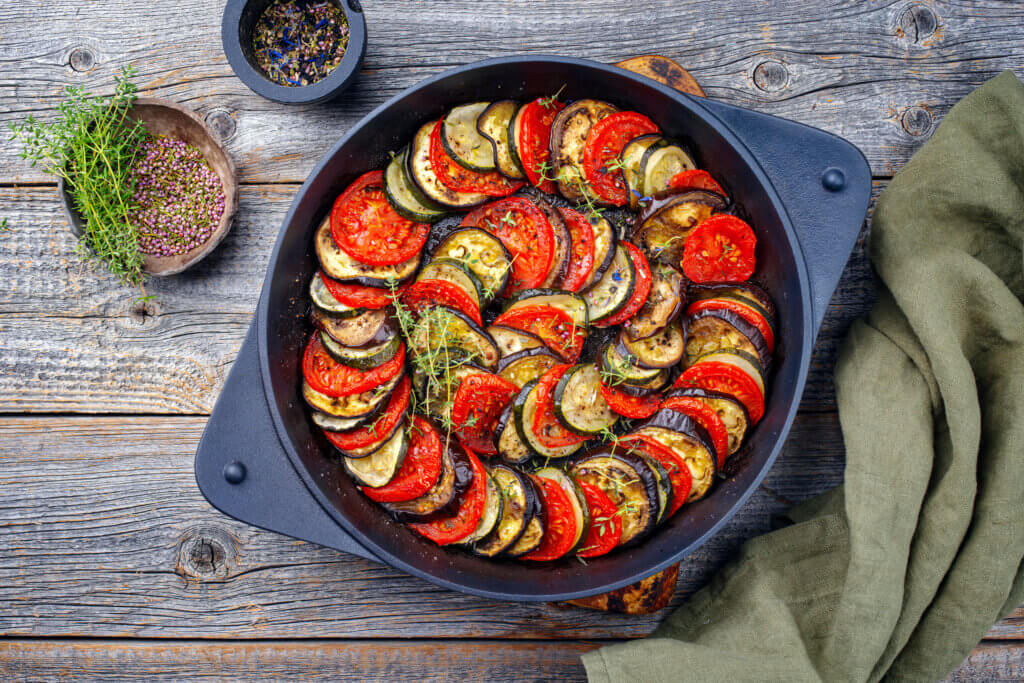How to Cook Heart-Healthy, Romantic Meals!
Imagine this: You see your significant other standing behind a cloth-covered table, a tender smile showing through soft lighting and candlelight, the aroma of a freshly made meal wafting around you, piano keys playing quietly in your ear… Whoa. SUPER romantic, right? It’s like every teenage girl’s dream.
But in all seriousness, mealtimes are important in relationships. Whether it’s a friendship, family, or romantic relationship, mealtimes are where we all break away from the stresses in our lives and take the time to connect. Maybe that’s why a romantic dinner is the most common event on Valentine’s Day for couples. But sometimes that can be hard to plan when we have to take health concerns into consideration and be mindful of the foods being used.
According to the Centers for Disease Control and Prevention (CDC), heart disease is the leading cause of death in the United States, accounting for nearly 1 in 4 deaths each year. Having a heart condition can be a great mental and emotional burden, so we want to make sure we are doing everything we can to care for our loved ones with heart conditions. For most, the first step to caring takes place in the kitchen.
What are Some Ingredients to Boost Heart Health?
Just like there are “superfoods” that are great for your health in general, there are many foods that are particularly good for your heart and promote heart-health. Here are some of the best options:
- Fruits and vegetables: Fruits and vegetables are high in fiber, vitamins, minerals, and antioxidants, all of which can help to reduce inflammation and improve heart health. Some of the best options include berries, leafy greens, avocados, and tomatoes.
- Gluten-free whole grains: Gluten-free whole grains like brown rice, quinoa, and millet, contain fiber, vitamins, minerals, and antioxidants that can promote heart health. Fiber helps lower cholesterol levels and reduce the risk of cardiovascular disease. Additionally, gluten-free whole grains regulate blood sugar levels, lower blood pressure, and reduce inflammation.
- Fatty fish: Fatty fish, such as salmon, mackerel, and sardines, are high in omega-3 fatty acids, which have anti-inflammatory properties and help to improve heart health.
- Nuts and seeds: Nuts and seeds are high in monounsaturated and polyunsaturated fats, fiber, and antioxidants, all of which can help to reduce the risk of heart disease. Examples of heart-healthy nuts and seeds include almonds, walnuts, chia seeds, and flaxseeds.
- Legumes: Legumes, such as beans, lentils, and chickpeas, are high in fiber, protein, and antioxidants, and help improve heart health.
- Avocado and olive oil: Avocado and olive oil are high in monounsaturated fats, which help improve cholesterol levels and reduce the risk of heart disease. Avocado oil has a neutral taste, which makes it a great versatile option to use in cooking. Olive oil is an excellent choice to use in salad dressings and dipping.
It’s important to keep in mind that these foods are most effective when consumed as part of a balanced diet that is low in unhealthy fats, added sugars, and iodized salt. Incorporating a variety of these foods into your diet and limiting your intake of processed foods can help to promote heart health.
What Ingredients Should You Avoid for Heart Conditions?
When cooking heart-healthy meals, it’s important to limit or avoid certain ingredients that can contribute to heart disease. Here are some ingredients to be mindful of:
- Trans fats: Trans fats can raise cholesterol levels and increase the risk of heart disease. Trans fats, also known as partially hydrogenated oils, are found in many processed and packaged foods.
- Refined Salts: Unlike refined salt, unrefined salt contains all of its original trace minerals (including magnesium, iron, potassium, calcium, copper, zinc, and phosphorus) and doesn’t feature any additives or preservatives. Processed and packaged foods, canned soups and vegetables, and restaurant foods often contain refined salts and are high in sodium. A healthy choice for salt is a real mineral salt such as Himalayan salt or Celtic salt.
- Added sugars: Consuming too much added sugar can lead to weight gain and an increased risk of heart disease. Added sugars are often found in sweetened beverages, baked goods, and processed snacks.
- Refined carbohydrates: Refined carbohydrates, such as white bread and pasta, can cause spikes in blood sugar levels and increase the risk of heart disease.
- Hydrogenated oils: Hydrogenated oils contain trans fats and should be avoided. These include shortening, soybean, and canola oil. These oils are commonly found in processed snacks and fried foods. Anything on the food label that says hydrogenated or partially hydrogenated oil is a trans fat and should be avoided.
By limiting or avoiding these ingredients and focusing on whole, nutrient-dense foods, you can help to promote heart health and reduce the risk of heart disease.
Let’s Try Some Heart-Healthy Recipe’s!
Now that you know a bit more about how different foods affect someone with a heart condition you can start to plan a meal for the special someone in your life! Each of the recipes below is written specifically to be heart-healthy, romantic, and delicious!
Heart-Healthy Venison Steak

Ingredients:
- 4 venison steaks, about 6 oz each
- 2 tablespoons of avocado oil
- Mineral salt and pepper, to taste
- 2 cloves of garlic, minced
- 2 tablespoons of balsamic vinegar
- 1 tablespoon of honey
- 2 cups of sliced mushrooms
- 1 cup of sliced shallots
- 1 cup of fresh spinach leaves
Instructions:
- Heat 1 tablespoon of avocado oil in a large skillet over medium heat.
- Season the venison steaks with mineral salt and pepper and add to the skillet. Cook for 4 to 5 minutes on each side, or until browned and cooked to your desired doneness.
- Remove the steaks from the skillet and set aside.
- In the same skillet, add another tablespoon of olive oil and the minced garlic. Cook for 1 minute, or until fragrant.
- Pour in the balsamic vinegar and honey, stirring to combine. Cook for 1 to 2 minutes, or until the mixture has reduced and thickened.
- Add the sliced mushrooms and shallots to the skillet. Cook for 5 minutes, or until the mushrooms are tender and the shallots are slightly caramelized.
- Add the spinach leaves to the skillet and stir until just wilted.
- Serve the venison steaks topped with the mushroom and shallot mixture, drizzled with the balsamic glaze.
Venison is a lean and healthy protein source, low in unhealthy fats and high in essential vitamins and minerals. This dish is also loaded with heart-healthy antioxidants and anti-inflammatory compounds from the mushrooms, shallots, and spinach. Enjoy!
Heart-Healthy Lemon and Herb Salmon Pasta

Ingredients:
- 8 ounces gluten-free pasta
- 1 tablespoon avocado oil
- 1 yellow onion, chopped
- 4 cloves garlic, minced
- 1 pound salmon fillet
- 1 lemon, juiced
- 2 tablespoons chopped fresh basil
- Mineral salt and pepper, to taste
- Grated Parmesan cheese, for serving (optional)
Instructions:
- Cook the pasta according to the package instructions. Drain and set aside.
- In a large skillet, heat the avocado oil over medium heat. Add the yellow onion and cook for 5-7 minutes or until softened.
- Add the garlic to the skillet and cook for an additional 30 seconds.
- Add the salmon to the skillet and cook for 4-6 minutes or until the salmon is cooked through.
- Stir in the lemon juice, fresh herbs, mineral salt, and pepper.
- Add the cooked pasta to the skillet and stir until the pasta is well coated with the lemon and herb mixture.
- Serve hot, topped with grated Parmesan cheese, if desired.
This pasta dish is a nutritious and flavorful option that provides a good source of heart-healthy omega-3 fatty acids from the salmon, fiber, and vitamins and minerals. The lemon and herbs add a touch of brightness and flavor to the dish, while the use of avocado oil helps to promote heart health. The Parmesan cheese is optional and can be used sparingly to add a touch of richness and flavor to the dish.
Heart-Healthy Ratatouille

Ingredients:
- 2 large eggplants, sliced
- 2 large zucchinis, sliced
- 2 red bell peppers, sliced
- 1 large onion, sliced
- 4 cloves of garlic, minced
- 2 tablespoons avocado oil
- 2 large tomatoes, diced (about 3 cups)
- 1 teaspoon dried thyme
- 1 teaspoon dried basil
- Mineral salt and pepper, to taste
Instructions:
- Preheat oven to 375°F (190°C).
- In a large bowl, combine the eggplant, zucchini, bell peppers, onion, garlic, avocado oil, thyme, basil, mineral salt, and pepper. Mix well to combine.
- Pour the diced tomatoes into a large, prepared baking dish.
- Transfer the vegetable mixture to a large baking dish and spread out evenly. Arranging the vegetables in neat, even rows enhance the appearance!
- Cover the baking dish with foil and bake for 45-50 minutes, or until the vegetables are tender and the sauce is thick and bubbly.
- Serve the ratatouille hot, either on its own or over a bed of gluten-free pasta or brown rice.
This heart-healthy ratatouille recipe is a fantastic way to enjoy a delicious and flavorful meal while also taking care of your heart. The eggplant, zucchini, and bell peppers are all rich in fiber, vitamins, and minerals, while the avocado oil provides healthy monounsaturated fats. Tomatoes are also a good source of antioxidants, including lycopene, which has been shown to have heart-protective benefits. By using fresh, whole ingredients and avoiding processed foods, you can enjoy a delicious meal that supports your heart health.
What The Oxford Center Offers for Heart Health

Adjusting your diet is one of the first of many steps someone with a heart condition will be recommended to take. Still, even with taking these steps, having a heart condition can be scary for the individual and for their family and loved ones. The Oxford Center offers many services to help alleviate and prevent heart disease and help you on your way to healing. We even sell high-quality mineral salt here at The Oxford Center for you to try!
Nutritional Services
Our nutritional services offer both individual and group classes that focus on finding the best foods/diets for you and your specific needs. Our certified Functional Nutrition Therapy Practitioner (FNTP)/ Restorative Wellness Practitioner (RWP) will work directly with you to identify any problems affecting you and help guide you to discover all the possibilities our program holds for improving your life and your health.
Hyperbaric Oxygen Therapy

Hyperbaric Oxygen Therapy (HBOT) has also proven to be immensely effective in improving heart disease. This therapy applies 100% pure oxygen to the body through increased atmospheric pressure. Once a person is in the increased atmospheric pressure, the body responds by reducing inflammation. With the inflammation reduced, blood flow to cells increases, enhancing the delivery of oxygen to oxygen-deprived areas. At this point, the body’s healing process accelerates. Past heart attack and heart condition clients have said their doctors were amazed by their progress, stating that they no longer show any signs of having a heart attack previously!
Having a heart condition can be scary and stressful for yourself and your loved ones, but it does not mean there is nothing you can do. Contact The Oxford Center today to discover how we can help you on your way to healing by calling 248-486-3636.
